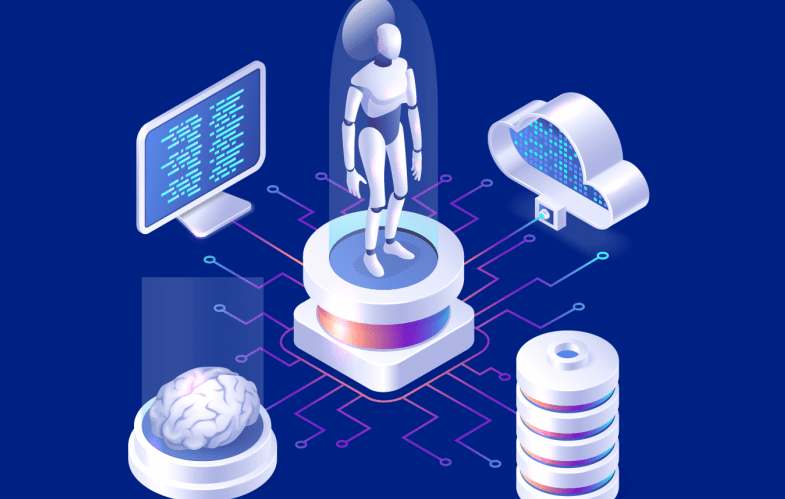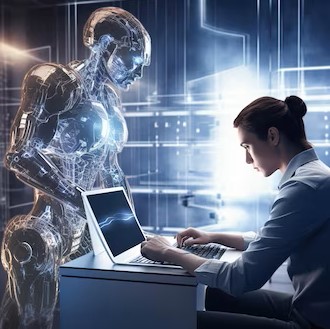AI Applications: Industry Revolutionized

Introduction
Artificial Intelligence (AI) has transformed various industries, reshaping how businesses operate, make decisions, and interact with customers. AI has become a game-changer in healthcare, finance, manufacturing, and entertainment. This blog post will explore the common AI applications in different industries, highlighting how this technology improves efficiency, decision-making, and customer experiences.
AI Applications Healthcare
AI is revolutionizing the healthcare industry by enhancing patient care, diagnosis, and treatment. Some common AI applications in healthcare include:
a. Disease Diagnosis: AI-powered diagnostic tools, such as image recognition software, can quickly and accurately identify diseases from medical images like X-rays, CT scans, and MRIs. This reduces the margin of error and speeds up the diagnostic process.
b. Predictive Analytics: AI can analyze patient data to predict disease outbreaks, patient admissions, and potential health issues. This enables healthcare providers to allocate resources more efficiently and improve patient outcomes.
c. Drug Discovery: AI algorithms help identify potential drug candidates and streamline the drug discovery process, reducing costs and expediting the development of new medications.
d. Telemedicine: AI-driven virtual assistants and chatbots provide 24/7 support, helping patients schedule appointments, answer common questions, and even monitor chronic conditions.
Finance
The financial sector heavily relies on AI to improve decision-making, fraud detection, and customer service. Common AI applications in finance include:
a. Algorithmic Trading: AI-driven algorithms analyze market trends and execute trades at high speeds, helping investors make data-driven decisions and increase profits.
b. Fraud Detection: AI can identify unusual patterns and behaviors, helping banks and credit card companies detect fraudulent activities in real-time.
c. Credit Scoring: AI algorithms assess a person’s creditworthiness by analyzing vast amounts of data, making credit decisions more accurate and equitable.
d. Customer Service: Chatbots and virtual assistants enhance customer service by answering queries, resolving issues, and providing personalized recommendations.
Manufacturing
Manufacturing industries leverage AI to optimize production processes, improve quality control, and reduce downtime. Common AI applications in manufacturing include:
a. Predictive Maintenance: AI analyzes sensor data to predict when machines and equipment will likely fail, enabling preventive maintenance and reducing downtime.
b. Quality Control: AI-powered computer vision systems inspect products for defects, ensuring high-quality output and minimizing wastage.
c. Supply Chain Optimization: AI helps optimize supply chain logistics, from demand forecasting and inventory management to route planning, reducing costs and improving efficiency.
d. Robotic Automation: AI-driven robots and cobots (collaborative robots) perform tasks with precision and adaptability, improving manufacturing efficiency.
Retail
AI has significantly impacted the retail industry, enhancing customer experiences and optimizing business operations. Common AI applications in retail include:
a. Personalized Recommendations: AI algorithms analyze customer data to provide personalized product recommendations, increasing sales and customer satisfaction.
b. Inventory Management: AI helps retailers optimize inventory levels, reducing overstock and understock situations.
c. Chatbots and Virtual Shopping Assistants: AI-powered chatbots assist customers with inquiries, offer product recommendations, and even process orders.
d. Visual Search: AI-driven visual search technology enables customers to find products by simply uploading images, making shopping more convenient.
Entertainment
AI is vital in the entertainment industry, from content creation to personalized experiences. Common AI applications in entertainment include:
a. Content Recommendation: Streaming services use AI to analyze user behavior and preferences, providing personalized content recommendations.
b. Content Creation: AI can generate content, including music, art, and even news articles, to augment human creativity.
c. Video and Audio Analysis: AI algorithms help content creators analyze video and audio data, making it easier to organize, edit, and search for specific content.
d. Virtual Reality and Augmented Reality: AI enhances immersive experiences in gaming and virtual reality by creating realistic characters and environments.
Agriculture
AI transforms agriculture by improving crop management, yield prediction, and resource utilization. Common AI applications in agriculture include:
a. Precision Agriculture: AI analyzes data from drones, sensors, and satellites to optimize planting, irrigation, and pest control.
b. Crop Disease Detection: AI image recognition technology can identify diseases and pests, allowing for early intervention and reduced crop loss.
c. Weather Prediction: AI-powered weather models provide more accurate forecasts, helping farmers plan activities and reduce weather-related risks.
d. Autonomous Farming: AI-driven autonomous tractors and machinery can handle tasks like plowing, planting, and harvesting, increasing efficiency and reducing labor costs.
Transportation
AI is reshaping the transportation industry, making vehicles smarter and travel more efficient. Common AI applications in transportation include:
a. Autonomous Vehicles: AI algorithms enable self-driving cars and trucks to navigate safely and efficiently.
b. Traffic Management: AI optimizes traffic flow by analyzing data from sensors and cameras, reducing congestion and improving road safety.
c. Predictive Maintenance: AI predicts when vehicles require maintenance, reducing breakdowns and minimizing downtime.
d. Ride-sharing and Routing: AI apps like Uber and Lyft use algorithms to match passengers with drivers and optimize routes, reducing travel time and costs.
Education
AI enhances education by personalizing learning experiences, automating administrative tasks, and improving student outcomes. Common AI applications in education include:
a. Adaptive Learning: AI-powered platforms adjust the pace and content of lessons based on individual student progress and learning styles.
b. Chatbots and Virtual Tutors: AI chatbots provide students with 24/7 support, answering questions and offering assistance with coursework.
c. Administrative Tasks: AI automates administrative tasks, such as scheduling, grading, and data management, freeing up educators’ time for teaching.
d. Early Intervention: AI can help identify students who may be struggling and provide timely interventions to improve their academic performance.
Conclusion
Artificial Intelligence significantly impacts various industries, driving innovation and transforming businesses’ operations. From healthcare to finance, manufacturing to retail, entertainment to agriculture, and education transportation, AI enhances efficiency, decision-making, and customer experiences. As it evolves, AI’s applications will become even more integral to industries worldwide. Staying informed and adapting to these technological advancements is essential for businesses and professionals looking to thrive in a rapidly changing world.






